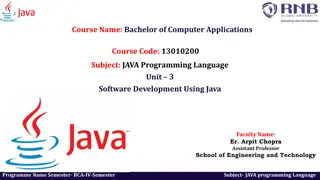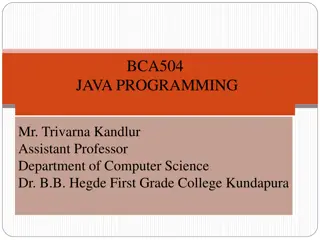Concurrency and Memory Sharing in Java Programming
Understanding concurrency and memory sharing in Java programming is crucial for managing shared resources efficiently. This includes concepts like ForkJoin, shared queues, and synchronized situations in examples like bank accounts. Proper synchronization is essential to prevent simultaneous access issues and ensure correct program execution. Despite correct implementations, concurrency errors can be non-deterministic and challenging to debug.
Download Presentation

Please find below an Image/Link to download the presentation.
The content on the website is provided AS IS for your information and personal use only. It may not be sold, licensed, or shared on other websites without obtaining consent from the author.If you encounter any issues during the download, it is possible that the publisher has removed the file from their server.
You are allowed to download the files provided on this website for personal or commercial use, subject to the condition that they are used lawfully. All files are the property of their respective owners.
The content on the website is provided AS IS for your information and personal use only. It may not be sold, licensed, or shared on other websites without obtaining consent from the author.
E N D
Presentation Transcript
CSE 332 Winter 2024 Lecture 22: Concurrency Nathan Brunelle http://www.cs.uw.edu/332
Memory Sharing With ForkJoin Idea of ForkJoin: Reduce span by having many parallel tasks Each task is responsible for its own portion of the input/output If one task needs another s result, use join() to ensure it uses the final answer This does not help when: Memory accessed by threads is overlapping or unpredictable Threads are doing independent tasks using same resources (rather than implementing the same algorithm)
Example: Shared Queue Imagine two threads are both using the same linked list based queue. enqueue(x){ if ( back == null ){ back = new Node(x); front = back; } else { back.next = new Node(x); back = back.next; } What could go wrong? }
Concurrent Programming Concurrency: Correctly and efficiently managing access to shared resources across multiple possibly-simultaneous tasks Requires synchronization to avoid incorrect simultaneous access Use some way of blocking other tasks from using a resource when another modifies it or makes decisions based on its state That blocking task will free up the resource when it s done Warning: Because we have no control over when threads are scheduled by the OS, even correct implementations are highly non-deterministic Errors are hard to reproduce, which complicates debugging
Bank Account Example The following code implements a bank account object correctly for a synchronized situation Assume the initial balance is 150 What Happens here? class BankAccount { private int balance = 0; int getBalance() { return balance; } void setBalance(int x) { balance = x; } void withdraw(int amount) { int b = getBalance(); if (amount > b) throw new WithdrawTooLargeException(); setBalance(b amount); } // other operations like deposit, etc. } withdraw(100); withdraw(75)
Bank Account Example - Parallel Assume the initial balance is 150 class BankAccount { private int balance = 0; int getBalance() { return balance; } void setBalance(int x) { balance = x; } void withdraw(int amount) { int b = getBalance(); if (amount > b) throw new WithdrawTooLargeException(); setBalance(b amount); } // other operations like deposit, etc. } Thread 1: withdraw(100); Thread 2: withdraw(75);
Interleaving Due to time slicing, a thread can be interrupted at any time Between any two lines of code Within a single line of code The sequence that operations occur across two threads is called an interleaving Without doing anything else, we have no control over how different threads might be interleaved
A Good Interleaving Assume the initial balance is 150 Thread 1: Thread 2: withdraw(100); withdraw(75); int b = getBalance(); if (amount > b) throw new Exception(); setBalance(b amount); int b = getBalance(); if (amount > b) throw new Exception(); setBalance(b amount);
A Bad Interleaving Assume the initial balance is 150 Thread 1: Thread 2: withdraw(100); withdraw(75); int b = getBalance(); int b = getBalance(); if (amount > b) throw new Exception(); setBalance(b amount); if (amount > b) setBalance(b amount); throw new Exception();
A Bad Fix Assume the initial balance is 150 class BankAccount { private int balance = 0; int getBalance() { return balance; } void setBalance(int x) { balance = x; } void withdraw(int amount) { if (amount > getBalance()) throw new WithdrawTooLargeException(); setBalance(getBalance() amount); } // other operations like deposit, etc. }
A still Bad Interleaving Assume the initial balance is 150 Thread 1: Thread 2: withdraw(100); withdraw(75); if (amount > getBalance()) throw new Exception(); if (amount > getBalance()) throw new Exception(); setBalance(getBalance() amount); setBalance(getBalance() amount); setBalance(getBalance() amount);
What we want Mutual Exclusion While one thread is withdrawing from the account, we want to exclude all other threads from also withdrawing Called mutual exclusion: One thread using a resource (here: a bank account) means another thread must wait We call the area of code that we want to have mutual exclusion (only one thread can be there at a time) a critical section. The programmer must implement critical sections! It requires programming language primitives to do correctly
A Bad attempt at Mutual Exclusion class BankAccount { private int balance = 0; private Boolean busy = false; int getBalance() { return balance; } void setBalance(int x) { balance = x; } void withdraw(int amount) { while (busy) { /* wait until not busy */ } busy = true; int b = getBalance(); if (amount > b) throw new WithdrawTooLargeException(); setBalance(b amount); busy = false;} // other operations like deposit, etc. }
A still Bad Interleaving Assume the initial balance is 150 Thread 1: Thread 2: withdraw(100); withdraw(75); while (busy) { /* wait until not busy */ } while (busy) { /* wait until not busy */ } busy = true; busy = true; int b = getBalance(); int b = getBalance(); if (amount > b) throw new Exception(); setBalance(b amount); busy = false; if (amount > b) setBalance(b amount); busy = false; throw new Exception();
Solution We need a construct from Java to do this One Solution A Mutual Exclusion Lock (called a Mutex or Lock) We define a Lock to be a ADT with operations: New: make a new lock, initially not held Acquire: If lock is not held, mark it as held These two steps always done together in a way that cannot be interrupted! If lock is held, pause until it is marked as not held Release: Mark the lock as not held
Almost Correct Bank Account Example class BankAccount { private int balance = 0; private Lock lck = new Lock(); int getBalance() { return balance; } void setBalance(int x) { balance = x; } void withdraw(int amount) { lk.acquire(); int b = getBalance(); if (amount > b) throw new WithdrawTooLargeException(); setBalance(b amount); lk.release();} // other operations like deposit, etc. } Questions: 1. What is the critical section? 2. What is the Error?
TryFinally Try Block: Body of code that will be run Finally Block: Always runs once the program exits try block (whether due to a return, exception, anything!)
Correct (but not Java) Bank Account Example class BankAccount { private int balance = 0; private Lock lck = new Lock(); int getBalance() { return balance; } void setBalance(int x) { balance = x; } void withdraw(int amount) { try{ lk.acquire(); int b = getBalance(); if (amount > b) throw new WithdrawTooLargeException(); setBalance(b amount); } finally { lk.release(); } } // other operations like deposit, etc. } Questions: 1. Should deposit have its own lock object, or the same one? 2. What about getBalance? 3. What about setBalance?
A still Bad Interleaving Assume the initial balance is 150 Thread 1: Thread 2: if(getBalance()<75) withdraw(100); setBalance(75); try{ lk.acquire(); int b = getBalance(); if (amount > b) throw new Exception(); if(getBalance() < 75) setBalance(75); finally { lk.release(); } setBalance(b amount); }
Whats wrong here class BankAccount { private int balance = 0; private Lock lck = new Lock(); int setBalance(int x) { try{ finally{ lk.release(); } } void withdraw(int amount) { try{ finally { lk.release(); } }} Withdraw calls setBalance! Withdraw can never finish because in setBalance the lock will always be held! lk.acquire(); balance = x; } lk.acquire(); int b = getBalance(); if (amount > b) throw new WithdrawTooLargeException(); setBalance(b amount); }
Re-entrant Lock (Recursive Lock) Idea: Once a thread has acquired a lock, future calls to acquire on the same lock will not block progress If the lock used in the previous slide is re-entrant, then it will work!
Re-entrant Lock Details A re-entrant lock (a.k.a. recursive lock) Remembers the thread (if any) that currently holds it a count of layers that the thread holds it When the lock goes from not-held to held, the count is set to 0 If (code running in) the current holder calls acquire: it does not block it increments the count On release: if the count is > 0, the count is decremented if the count is 0, the lock becomes not-held
Javas Re-entract Lock Class java.util.concurrent.locks.ReentrantLock Has methods lock() and unlock() Important to guarantee that lock is always released!!! Recommend something like this: myLock.lock(); try { // method body } finally { myLock.unlock(); }
How this looks in Java java.util.concurrent.locks.ReentrantLock; class BankAccount { private int balance = 0; private ReentrantLock lck = new ReentrantLock(); int setBalance(int x) { try{ finally{ lk.unlock(); } } void withdraw(int amount) { try{ finally { lk.unlock(); } }} lk.lock(); balance = x; } lk.lock(); int b = getBalance(); if (amount > b) throw new WithdrawTooLargeException(); setBalance(b amount); }
Java Synchronized Keyword Syntactic sugar for re-entrant locks You can use the synchronized statement as an alternative to declaring a ReentrantLock Syntax: Any Object can serve as a lock Primitive types (e.g. int) cannot serve as a lock Acquires a lock and blocks if necessary Once you get past the { , you have the lock Released the lock when you pass } Even in the cases of returning, exceptions, anything! Impossible to forget to release the lock synchronized( /* expression returning an Object */ ) {statements}
Back Account Using Synchronize (Attempt 1) class BankAccount { private int balance = 0; private Object lk = new Object(); int getBalance() { synchronized (lk) { return balance; } } void setBalance(int x) { synchronized (lk) { balance = x; } } void withdraw(int amount) { synchronized (lk) { int b = getBalance(); if (amount > b) throw new Exception(); setBalance(b amount); } } // deposit would also use synchronized(lk) }
Back Account Using Synchronize (Attempt 2) class BankAccount { private int balance = 0; int getBalance() { synchronized (this) { return balance; } } void setBalance(int x) { synchronized (this) { balance = x; } } void withdraw(int amount) { synchronized (this) { int b = getBalance(); if (amount > b) throw new Exception(); setBalance(b amount); } } // deposit would also use synchronized(lk) } Since we have one lock per account regardless of operation, it s more intuitive to use the account object itself as the lock!
More Syntactic Sugar! Using the object itself as a lock is common enough that Java has convenient syntax for that as well! Declaring a method as synchronized puts its body into a synchronized block with this as the lock
Back Account Using Synchronize (Final) class BankAccount { private int balance = 0; synchronized int getBalance() { return balance; } synchronized void setBalance(int x) { balance = x; } synchronized void withdraw(int amount) { int b = getBalance(); if (amount > b) throw new WithdrawTooLargeException(); setBalance(b amount); } // other operations like deposit (which would use synchronized) }
Race Condition Occurs when the computation result depends on scheduling (how threads are interleaved) We, as programmers can t influence scheduling of threads We need to write programs that work independent of scheduling E.g.: if two threads are withdrawing, different schedules could cause different threads to see the WithdrawTooLargeException Data Race: When there is the potential for two threads to be writing a variable in parallel When there is the potential for one thread to be reading a variable while another writes to it E.g.: Two threads insert the same into a hash table. The second thread in the schedule will overwrite the insert from the first. Bad Interleaving: A race condition other than a data race Usually it looks like exposing a bad intermediate state E.g.: Two threads insert into a hash table. We compute the index for each key, then one thread resizes the table, now the other index might be incorrect.
Example: Shared Stack (no problems so far) class Stack { private E[] array = (E[])new Object[SIZE]; private int index = -1; synchronized boolean isEmpty() { return index==-1; } synchronized void push(E val) { array[++index] = val; } synchronized E pop() { if(isEmpty()) throw new StackEmptyException(); return array[index--]; } } Critical sections of this code?
Race Condition, but no Data Race class Stack { private E[] array = (E[])new Object[SIZE]; private int index = -1; synchronized boolean isEmpty() { } synchronized void push(E val) { } synchronized E pop() { } E peek(){ E ans = pop(); push(ans); return ans; } Critical sections of this code? }
Race Condition, including a Data Race class Stack { private E[] array = (E[])new Object[SIZE]; private int index = -1; synchronized boolean isEmpty() { } synchronized void push(E val) { } synchronized E pop() { } E peek(){ System.out.println(index); E ans = pop(); push(ans); return ans; } }
Expected Behavior: Thread 2 should not see an empty stack if there is a push but no pop. Peek and isEmpty Thread 1: Thread 2: push(x); boolean b = isEmpty(); peek(); push(x); E ans = pop(); boolean b = isEmpty(); push(ans); return ans;
Expected Behavior: Thread 2 items from a stack are popped in LIFO order Peek and Push Thread 1: Thread 2: push(x); push(y); System.out.println(pop()); System.out.println(pop()); peek(); E ans = pop(); push(ans); return ans; push(x); push(y); System.out.println(pop()); System.out.println(pop());
Expected Behavior: Thread 2 items from a stack are popped in LIFO order Peek and Push Thread 1: Thread 2: push(x); push(y); System.out.println(pop()); System.out.println(pop()); peek(); push(x); E ans = pop(); push(y); push(ans); return ans; System.out.println(pop()); System.out.println(pop());
How to fix this? Make a bigger critical section class Stack { private E[] array = (E[])new Object[SIZE]; private int index = -1; synchronized boolean isEmpty() { } synchronized void push(E val) { } synchronized E pop() { } E peek(){ E ans = pop(); push(ans); return ans; } }
How to fix this? Make a bigger critical section class Stack { private E[] array = (E[])new Object[SIZE]; private int index = -1; synchronized boolean isEmpty() { } synchronized void push(E val) { } synchronized E pop() { } synchronized E peek(){ E ans = pop(); push(ans); return ans; } }
Did this fix it? No! Now it has a data race! class Stack { } private E[] array = (E[])new Object[SIZE]; private int index = -1; synchronized boolean isEmpty() { } synchronized void push(E val) { } synchronized E pop() { } E peek(){ return array[index]; }
Memory Categories All memory must fit one of three categories: 1. Thread Local: Each thread has its own copy 2. Shared and Immutable: There is just one copy, but nothing will ever write to it 3. Shared and Mutable: There is just one copy, it may change Requires Synchronization!
Thread Local Memory Whenever possible, avoid sharing resources Dodges all race conditions, since no other threads can touch it! No synchronization necessary! (Remember Ahmdal s law) Use whenever threads do not need to communicate using the resource E.g., each thread should have its on Random object In most cases, most objects should be in this category
Immutable Objects Whenever possible, avoid changing objects Make new objects instead Parallel reads are not data races If an object is never written to, no synchronization necessary! Many programmers over-use mutation, minimize it
Shared and Mutable Objects For everything else, use locks Avoid all data races Every read and write should be projected with a lock, even if it seems safe Almost every Java/C program with a data race is wrong Even without data races, it still may be incorrect Watch for bad interleavings as well!
Consistent Locking For each location needing synchronization, have a lock that is always held when reading or writing the location The same lock can (and often should) guard multiple fields/objects Clearly document what each lock guards! In Java, the lock should usually be the object itself (i.e. this ) Have a mapping between memory locations and lock objects and stick to it!
Lock Granularity Coarse Grained: Fewer locks guarding more things each One lock for an entire data structure One lock shared by multiple objects (e.g. one lock for all bank accounts) Fine Grained: More locks guarding fewer things each One lock per data structure location (e.g. array index) One lock per object or per field in one object (e.g. one lock for each account) Note: there s really a continuum between them
Example: Separate Chaining Hashtable Coarse-grained: One lock for the entire hashtable Fine-grained: One lock for each bucket Which supports more parallelism in insert and find? Which makes rehashing easier? What happens if you want to have a size field?
Tradeoffs Coarse-Grained Locking: Simpler to implement and avoid race conditions Faster/easier to implement operations that access multiple locations (because all guarded by the same lock) Much easier for operations that modify data-structure shape Fine-Grained Locking: More simultaneous access (performance when coarse grained would lead to unnecessary blocking) Can make multi-location operations more difficult: say, rotations in an AVL tree Guideline: Start with coarse-grained, make finer only as necessary to improve performance
Similar But Separate Issue: Critical Section Granularity Coarse-grained For every method that needs a lock, put the entire method body in a lock Fine-grained Keep the lock only for the sections of code where it s necessary Guideline: Try to structure code so that expensive operations (like I/O) can be done outside of your critical section E.g., if you re trying to print all the values in a tree, maybe copy items into an array inside your critical section, then print the array s contents outside.
Atomicity Atomic: indivisible Atomic operation: one that should be thought of as a single step Some sequences of operations should behave as if they are one unit Between two operations you may need to avoid exposing an intermediate state Usually ADT operations should be atomic You don t want another thread trying to do an insert while another thread is rotating the AVL tree Think first in terms of what operations need to be atomic Design critical sections and locking granularity based on these decisions























